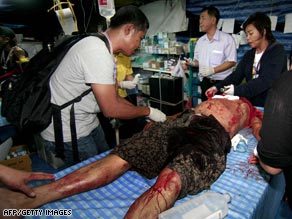* Japan PM Aso says economy worsening rapidly
* Govt to sell over Y10 trln new bonds to pay for stimulus
* $154 bln stimulus spending plan seen boosting GDP 2 pct pts
* Markets see major new issuance, steepen bond yield curve
By Yuzo Saeki
TOKYO, April 10 (Reuters) - Prime Minister Taro Aso said on Friday Japan's economy was in crisis, as he formally announced government plans to spend $154 billion to help lift the country out of its deepest recession since World War Two.
"Japan's economy is worsening rapidly with exports and production tumbling. Job conditions are also deteriorating sharply," Aso told a media conference.
"Japan's economy can be described as being in a crisis."
Finance minister Kaoru Yosano said the government would issue more than 10 trillion yen ($100 billion) in new bonds to pay for the package, which would raise total issuance this year by at least a third to a record 44 trillion yen.
The government said the 15.4 trillion yen ($154 billion) in new stimulus spending was equivalent to 3 percent of GDP and was expected to push up real economic growth by 2 percent in the financial year to next March. It is the fourth such package in the past year and brings stimulus spending to around 5 percent of GDP as Japan battles a deepening slump with the global financial turmoil shrivelling demand for its cars, technology and other manufactured exports.
A senior government cabinet minister said this week he expected 10-11 trillion yen in additional new bonds to be sold, which would raise issuance by a third to a record 44 trillion yen this year.
Worries about the government's need to issue much more debt and the accompanying rise in long-term rates have caused a sharp steepening for the government bond yield curve.
The spread between the two- and 20-year yields reached 170.5 basis points earlier this week, its widest level in three years, although it has come back to 165 basis points.
The benchmark 10-year yield touched a five-month high of 1.490 percent on Friday but closed lower ahead of the announcement, at 1.450 percent.
Japan's government debt is already the highest among industrialised nations at about 150 percent of gross domestic product, prompting some lawmakers to warn there is a limit to how much stimulus it can afford.
Japan's economy tumbled 3.2 percent in the last quarter of last year and plunging business confidence has raised fears the situation is getting worse.
The world's No.2 economy has been more severely hit by the global recession than other major economies due to its heavy dependence on exports.
But other major economies are not immune, with the United States announcing a $787 billion stimulus package and European Union countries planning fiscal stimulus of 3 to 4 percent of GDP.
The government's stimulus efforts may yet face a rocky ride in a divided parliament, where the opposition controls the upper house and can delay legislation.
Prime Minister Taro Aso said on Thursday that the timing of a general election that must be held by October would depend on how opposition parties cooperate in implementing the stimulus plan.
Previous plans to respond to Japan's dire economic situation have been delayed by the parliamentary deadlock.
Aso has said he might call a snap election if the opposition delays enactment of budget bills needed to fund the stimulus package.
A senior official in the main opposition Democratic Party said on Friday his party had no plan to drag things out unnecessarily.
"It seems that Prime Minister Aso wants to link this issue with the election. We don't think it is necessarily desirable to resist and needlessly take time under these economic conditions," Yukio Hatoyama said in a news conference.
But an economist warned that expectations of an election could prompt lawmakers to try to earmark spending for their constituencies in an attempt to win voters' favour.
"As the lower house must hold an election by this autumn,
there is a greater chance that public works projects backed by
political interests could be included in the stimulus plan," said
Yasuhiro Onakado, chief economist at Daiwa SB Investments.
($1=100.21 Yen)
(Additional reporting by Yoko Kubota
'Business' 카테고리의 다른 글
| Nintendo motion control accessory to launch June 8 (0) | 2009.04.14 |
|---|---|
| Why? Hannah Montana? Miley Cyrus? (0) | 2009.04.14 |
| Like Apple, Amazon, Wal-Mart change music prices (0) | 2009.04.09 |
| SEC Puts Forward Proposals on Regulations to Restrict Short-Selling (0) | 2009.04.09 |
| `Fast & Furious' revs to $71 million debut weekend (0) | 2009.04.07 |




